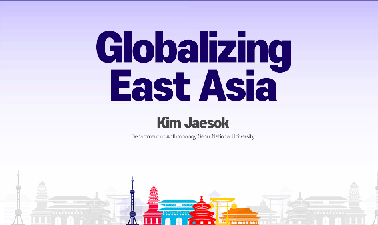
SNUx: Globalizing East Asia
by Seoul National University
Changing Culture and Society in East Asia
Course Description
This captivating course, "Changing Culture and Society in East Asia," offers an in-depth exploration of the dynamic transformations occurring in South Korea, China, and Japan. As a student, you'll embark on a fascinating journey through time, examining how local cultures have evolved in response to major historical events and global influences. This course challenges the common perception of globalization as a one-way process and instead presents a nuanced understanding of how local agencies have shaped unique cultural and societal forms in each country.
What students will learn from the course
- A comprehensive understanding of the cultural and societal changes in South Korea, China, and Japan
- The ability to critically analyze the myth of West-centered globalization
- Insights into the transformation from traditional to contemporary society and culture in East Asia
- An understanding of how global elements become integrated into local cultures
- The historical processes behind the rise of Japanese and Korean popular culture
- The impact of industrialization, war, socialism, capitalism, and consumerism on East Asian societies
- The role of local agency in shaping globalization outcomes
Pre-requisite or skills necessary to complete the course
There are no specific prerequisites for this course. It is designed as an introductory-level course, making it accessible to students from various backgrounds. However, a general interest in East Asian culture, history, and globalization would be beneficial.
What the course will cover
- Traditional societies based on patriarchy, Confucian ethics, and subsistence agriculture
- The impact of industrialization and modernization on East Asian countries
- The role of war and socialism in shaping societal changes
- The expansion of capitalist economies and emerging consumerism
- The influence of multinational corporations on local cultures
- The rise and global impact of Japanese and Korean popular culture
- The unique paths of historical-cultural transformations in each country
- The bilateral process of localized globalization
- Critiques of "universal modernization" and the "learn-from-Japan" campaign
- The limits and social costs of various modernization models
- The mechanisms of civil protest and political democratization
- The impacts of economic crises on workplace culture
- The emergence of consumerism in post-socialist China
Who this course is for
- Students interested in East Asian studies, cultural anthropology, or international relations
- Professionals working in fields related to East Asian business, diplomacy, or cultural exchange
- Anyone fascinated by the interplay between global influences and local cultures
- Individuals seeking to understand the complexities of modernization and globalization in non-Western contexts
- Those interested in the rise of East Asian popular culture and its global impact
How learners can use these skills in the real world
- Enhancing cross-cultural communication and understanding in international business settings
- Informing policy-making decisions related to East Asian countries
- Improving cultural sensitivity in diplomatic or NGO work
- Providing valuable insights for marketing strategies targeting East Asian consumers
- Enriching travel experiences to East Asian countries through deeper cultural understanding
- Developing a more nuanced perspective on global affairs and international relations
- Applying critical thinking skills to analyze complex societal changes in various contexts
Syllabus
- Lecture 1: Japan as a "Model" Country of Modernization
- Lecture 2: "Japanese" Modernization & Corporate Culture Debate
- Lecture 3: Traditional China: Land, Lineage, and Male Domination
- Lecture 4: From Radical Socialism to "Reform and Openness"
- Lecture 5: Traditional Korea & "Militarized" Modernity
- Lecture 6: Changes in Workplace & Impacts of Globalization
- Lecture 7: Faces of Consumption in East Asia
- Lecture 8: Japanese Popular Culture & "Korean Wave"
